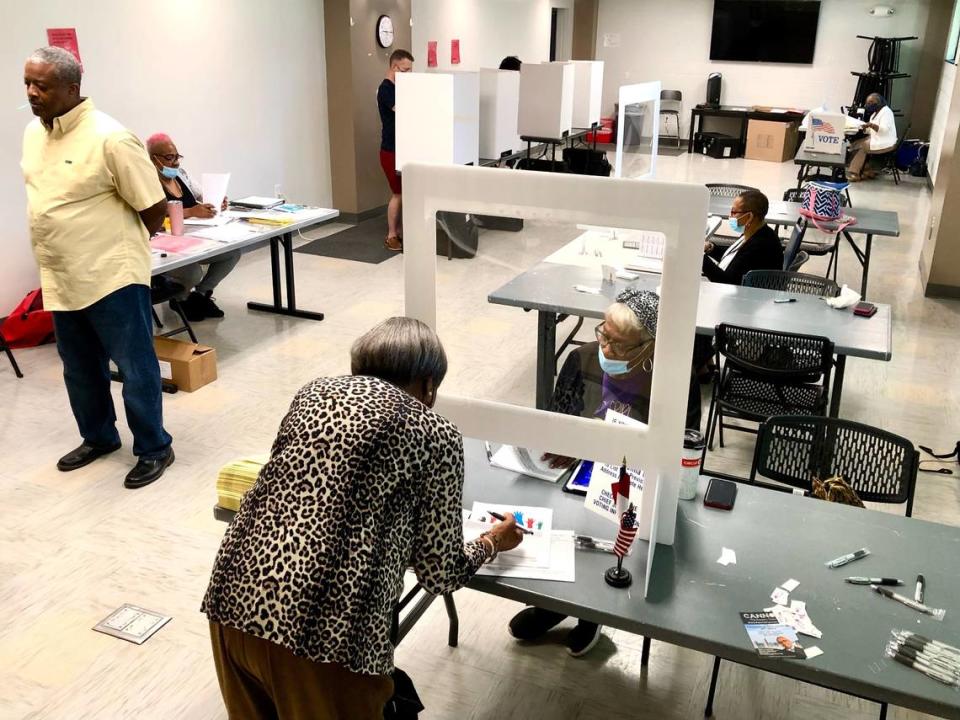What the NC Supreme Court’s voter ID decision means for the 2024 elections
With the new North Carolina Supreme Court decision that came Friday about using voter ID for elections, there could be changes ahead for voters in the 2024 presidential election.
Challengers failed to prove lawmakers discriminated by passing the voter ID law, the court said in a decision on Holmes v. Moore. The now majority-Republican Supreme Court reversed the December decision made by the previous court that was majority Democrats.
So what does this actually mean for voters?
“The most basic level, it means you’re gonna need an ID to vote in 2024,” Western Carolina University political science professor Chris Cooper told The News & Observer on Friday.
Among the acceptable forms of identification include a valid, unexpired North Carolina driver’s license, United States passport, state voter identification card, and local or state government employee ID card.
“There are a number of questions that remain on the implementation, particularly as it relates to absentee balloting. But you’re going to need an ID to vote,” he said. “We will see what they end up accepting. I think there are other implementation questions about what IDs exactly are going to count, we’ve heard before that university IDs could count under certain circumstances. And so we’ll have to see if that remains true.”
Other court decisions will play a role. A trial is expected on a federal case. Yet another case involves a constitutional amendment passed by voters.
“This is an issue that, in addition to the General Assembly deciding a number of times to put in voter ID, this was a constitutional amendment, so people did vote for voter ID — (a) majority of the voters.”
‘Will of the people?’
House Speaker Tim Moore said Friday that the decision means “the will of the people of North Carolina (is) honored.”
“Nearly five years after the voters of this state overwhelmingly voted in favor of photo ID at the polls, it has finally become the law of the land,” said Moore, a Kings Mountain Republican.
Holmes v. Moore is about Senate Bill 824, which details the implementation of the voter ID constitutional amendment passed by voters in 2018.
The court opinion from the majority, written by Justice Phil Berger Jr., the son of the Republican Senate leader, also references the voter ID amendment approved by voters.
“The people of North Carolina overwhelmingly support voter identification and other efforts to promote greater integrity and confidence in our elections,” the opinion states.
“Subjective tests and judicial sleight of hand have systematically thwarted the will of the people and the intent of the legislature. But no court exists for the vindication of political interests, and judges exceed constitutional boundaries when they act as a superlegislature,” the majority opinion says.
Could voters be disenfranchised?
Jeff Loperfido, interim chief counsel for voting rights at the Southern Coalition for Social Justice and one of the lawyers who argued the case, said they don’t yet know all this means for voters. The related federal case could proceed toward trial later this year or next year, he said.
On a press call with reporters on Friday, Loperfido said there now needs to be “adequate buildup and education activity” because “this doesn’t seem like the type of thing that can with a snap of fingers can just be rolled out the next election.”
That includes new training for poll workers, getting the word out to voters, and reaching out to individual voters who don’t have required IDs, he said.
“And this has to be done by by everybody: election officials, groups like ours, and anyone else who can get the word out that the law’s going to change and it’s going to change soon — and people need to be made aware of that,” Loperfido said.
“Otherwise, there’s just going to be chaos at the polls. And many eligible voters are going to be disenfranchised because they don’t know that the rules have changed, again, when they go in to vote,” he said.
North Carolina has had one previous election that required voter ID. Loperfido said that after previous voter ID legislation in 2013, which was later struck down, there was a lengthy rollout period before that election.

Cooper, the politics professor, said the State Board of Elections “is going to have a lot of work to do to figure out exactly how they’re going to implement this law.”
“We’re not out of the woods yet on voter ID. Those (pending legal) cases could still matter and we just don’t know yet,” he said. “In North Carolina politics, I think the most recent ruling is almost never the final one. This is no exception.”

